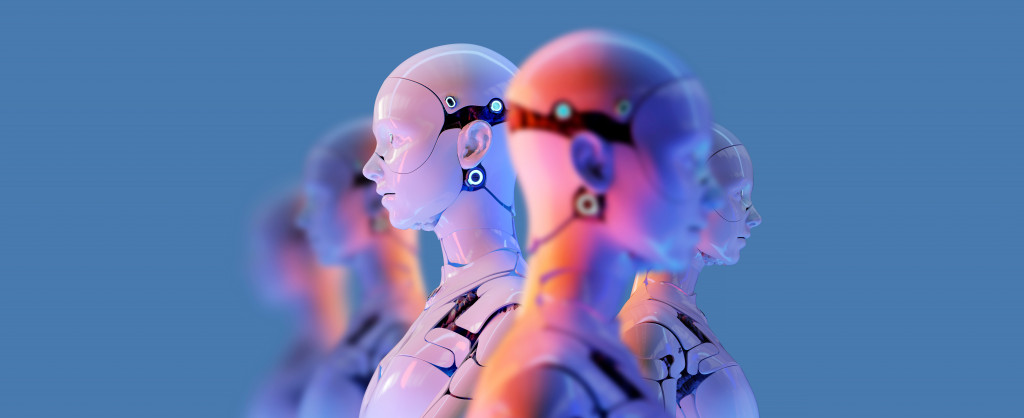Artificial intelligence (AI) has been a topic of discussion for decades, and its impact on society continues to be a subject of debate. Some believe that AI carries the capabilities to transform industries and improve our lives in countless ways using data science and artificial intelligence, while others are concerned about the risks that come with creating machines that can think and learn like humans.
In this essay, I will explore both sides of the argument and provide my perspective on the role of AI in our society.
An Optimist’s View of AI’s Industry Applications
On one hand, proponents of AI argue that it has the potential to solve some of the world’s most pressing problems. For example, AI and AI analytics could be used to develop new medicines and treatments for diseases, optimize transportation networks to reduce traffic congestion and emissions, and help prevent natural disasters by predicting when and where they will occur. In addition, AI can increase productivity and efficiency in a variety of industries, from manufacturing to finance to healthcare.
Moreover, some argue that AI can potentially create new forms of art and expression. For example, AI-generated music and visual art are already being created, and some people argue that these forms of expression can be just as meaningful and powerful as those created by human artists. Additionally, AI can be used to enhance existing forms of art by providing new tools and techniques for artists to use.
The Skeptic’s View of the AI Explosion
On the other hand, there are those who are concerned about the risks associated with AI. One of the biggest risks is the possibility of AI becoming too powerful and taking control of society. This scenario, known as the “AI takeover,” is a common theme in science fiction and is a legitimate concern for many researchers and experts.
Another risk associated with AI is the risk of bias and discrimination. Because AI algorithms are trained on historical data, they may propagate and even enhance existing biases in society. This can have serious consequences in areas like criminal justice, where AI data analytics strategies are already being used to make decisions about things like bail and sentencing.
Furthermore, there are concerns about the impact of AI on employment. As AI becomes more advanced, there is a risk that it will replace human workers in a wide range of industries. While some argue that this will lead to increased productivity and efficiency, others worry about the impact on workers and the broader economy.
Moreover, there are concerns about the impact of AI on privacy and security. As AI becomes more ubiquitous, it will be able to collect and analyze vast amounts of data about individuals, raising questions about who has access to this information and how it will be used.
What’s the Right Approach Going Ahead?
In my view, the benefits of AI outweigh the risks, but it is important to proceed with caution. AI is capable of transforming our world in countless positive ways, but we should be mindful of the risks and take measures to mitigate them. This means investing in research and development to ensure that AI is developed responsibly and ethically and that it is used to benefit society as a whole.
- One of the key ways to mitigate the risks associated with AI is through regulation. Governments and other organizations must work together to develop ethical frameworks and standards for the development and use of AI. This includes addressing issues like bias and discrimination, as well as ensuring that AI is used in a transparent and accountable way.
- Additionally, we must invest in education and training to ensure that people are prepared for the changing nature of work in an AI-driven economy.
- Another important consideration is the need for interdisciplinary collaboration. AI is a complex and multifaceted field, and its development and use will require input from experts in a wide range of fields, including computer science, ethics, philosophy, law, and sociology. By bringing together experts from these different fields, we can ensure that AI is developed and used in a way that is responsible, ethical, and beneficial for society as a whole.
Problems Faced in the Current Era Due to AI
In today’s world and looking towards the future, any data analytics strategy and industry application based on AI faces several challenges and potential problems. Here are some notable issues:
- Deepfakes and Misinformation: AI-powered deepfake technology can generate highly realistic fake images, videos, or audio, which can be used to spread misinformation, create fake news, or manipulate public opinion. Detecting and combatting deepfakes is a significant challenge for society.
- Job Disruption and Economic Inequality: AI and automation have the potential to automate and replace many jobs, leading to unemployment and economic disparities. This can widen the gap between those with the necessary skills to work with AI and those who are left behind.
- Algorithmic Bias and Discrimination: AI systems can inherit biases present in the data used for training. This can result in discriminatory outcomes, such as biased hiring practices or unfair treatment in criminal justice systems. Efforts are needed to address and mitigate algorithmic biases.
- Security and Privacy Risks: AI systems can be vulnerable to attacks, including data breaches, adversarial attacks, or unauthorized access. Protecting AI systems from malicious actors and ensuring data privacy are ongoing concerns.
- Autonomous Weapons and Ethical Concerns: The development of autonomous weapons powered by AI raises ethical questions and concerns about the potential misuse of such technology. The lack of human control and the ability to make life-or-death decisions pose significant ethical challenges.
- Lack of Accountability and Transparency: The complex nature of AI algorithms and decision-making processes can make it difficult to assign responsibility when something goes wrong. Ensuring accountability and transparency in AI systems is crucial for building trust and addressing potential risks.
- AI-generated Cybersecurity Threats: As AI advances, it can also be used by cybercriminals to launch sophisticated attacks, such as AI-powered malware or hacking techniques. This creates a constant battle between cybersecurity experts and malicious actors.
- Social and Ethical Impact: AI can have far-reaching social and ethical consequences. It can affect social interactions, privacy norms, and the concept of work. Addressing these broader impacts and ensuring that AI benefits society as a whole requires careful consideration.
It is important to anticipate and address these challenges through responsible AI development, regulation, and collaboration between researchers, policymakers, and industry stakeholders. Ethical guidelines, robust governance frameworks, and ongoing research and development are necessary to mitigate potential problems and maximize the positive impact of AI in our world.
Possible Solutions to Address These Challenges
Addressing the problems associated with data science and artificial intelligence requires a comprehensive and multidimensional approach involving various stakeholders. Here are some potential solutions to the aforementioned challenges:
- Data Bias: Develop diverse and representative datasets to reduce bias in training data. Employ fairness metrics to identify and mitigate bias in AI systems. Implement guidelines and regulations that promote ethical data collection and usage.
- Transparency and Explainability: Promote research and development of explainable AI techniques to provide insights into AI decision-making processes. Encourage the adoption of transparent algorithms and models that allow users to understand how AI arrives at its conclusions.
- Privacy Protection: Establish robust data protection regulations and frameworks. Encourage organizations to adopt privacy-preserving AI techniques like federated learning or differential privacy. Implement measures to anonymize and secure personal data.
- Ethical Decision Making: Foster interdisciplinary collaboration between AI researchers, ethicists, and philosophers to develop ethical frameworks for AI systems. Involve diverse perspectives in designing and deploying AI technologies to address moral dilemmas.
- Job Displacement and Economic Inequality: Invest in education and training programs to equip individuals with skills relevant to the AI-driven job market. Implement policies that promote the transition and retraining of workers. Explore the concept of universal basic income or other social safety nets.
- Security Measures: Enhance the security of AI systems through rigorous testing, vulnerability assessments, and monitoring for adversarial attacks. Foster collaboration between AI and cybersecurity experts to develop robust defense mechanisms against AI-generated threats.
- Human-AI Interaction: Design user-friendly interfaces that promote clear communication between humans and AI systems. Focus on developing AI systems that collaborate with humans as partners, augmenting human capabilities rather than replacing them. Educate users on the limitations and potential biases of AI systems.
- Accountability and Responsibility: Establish legal frameworks and regulations that define liability and responsibility in AI-related incidents. Encourage organizations to conduct thorough risk assessments and adhere to ethical guidelines. Foster transparency and open dialogue between developers, policymakers, and the public.
- Combating Deepfakes and Misinformation: Invest in research and development of advanced deepfake detection techniques. Promote media literacy and critical thinking skills to help individuals identify and evaluate misinformation. Develop authentication mechanisms to verify the authenticity of digital content.
- Social and Ethical Impact: Encourage interdisciplinary research and public discourse on the social implications of AI. Foster collaboration between academia, industry, policymakers, and civil society organizations to address ethical concerns and shape AI policies.
What Does the Future Hold for AI?
Artificial intelligence (AI) and AI data analytics have become an increasingly prevalent and influential technology in our society. It has the power to change the way we live, work, and interact with each other. However, as with any new technology, there are both opportunities and risks associated with the development and deployment of AI.
One of the biggest advantages of AI is its ability to process large amounts of data quickly and accurately. This has significant implications for fields such as healthcare, where AI can help identify patterns in patient data to improve diagnoses and treatments. In addition, AI can improve the efficiency and safety of transportation systems, as well as optimize energy usage in buildings and homes.
However, the increasing use of AI has raised concerns about the potential negative consequences of this technology.
One concern is the potential for job displacement as AI takes over tasks that were previously performed by humans. This has already occurred in certain industries, such as manufacturing, where robots and automation have replaced workers. Another concern is the potential for AI to perpetuate and even amplify existing biases and discrimination, particularly in areas such as criminal justice, where AI is already being used to make decisions.
Moreover, the use of AI and AI analytics raises ethical questions about who is responsible for the decisions made by AI systems. AI algorithms are only as unbiased and ethical as the data they are trained on, which means that AI systems can perpetuate and even amplify existing biases and discrimination. This raises questions about accountability and transparency, particularly in cases where AI is used to make decisions that affect people’s lives.
In my view, the development and deployment of AI must be guided by a framework of ethical principles that prioritize transparency, accountability, and fairness. AI must be developed in a way that minimizes the risk of unintended consequences, and the potential negative impacts of AI must be addressed proactively.
Moreover, the development and deployment of AI must be grounded in an understanding of its potential risks and benefits, as well as the ethical considerations that arise from its use.
One of the primary ways to ensure that AI is developed and deployed in a responsible manner is through interdisciplinary collaboration. This means bringing together experts from a range of fields, including computer science, ethics, law, and social science, to work together to develop ethical frameworks and standards for the development and deployment of AI.
This interdisciplinary approach can help ensure that AI is developed and used in a way that is transparent, accountable, and beneficial for society as a whole.
The future perspective of AI is filled with exciting possibilities and potential advancements. Here are some key areas to consider:
- Artificial General Intelligence (AGI): AGI refers to highly autonomous systems that possess human-like cognitive abilities across a wide range of tasks. While achieving AGI remains a significant challenge, researchers are working towards developing more advanced and generalized AI systems that can learn and adapt in diverse environments.
- Explainable AI (XAI): The need for transparency and interpretability in AI analytics systems is gaining attention. XAI aims to make AI models and decision-making processes more understandable and explainable to humans. This will enhance trust, enable better error detection, and provide insights into how AI systems arrive at their conclusions.
- Quantum AI: The combination of AI and quantum computing holds immense potential. Quantum AI algorithms and technologies can provide exponential processing power and accelerate the capabilities of AI systems, enabling breakthroughs in various fields such as cryptography, optimization, and complex pattern recognition.
- AI in Healthcare: AI will continue to play a crucial role in transforming healthcare. Advanced AI algorithms can assist in early disease detection, personalized treatment planning, drug discovery, and precision medicine. AI-powered systems will improve medical imaging analysis, patient monitoring, and decision support for healthcare professionals.
- AI and Robotics Collaboration: The integration of AI with robotics will lead to significant advancements in areas such as industrial automation, elderly care, and disaster response. Collaborative robots (cobots) will work alongside humans, enhancing productivity and safety in various industries.
- AI in Edge Computing: Edge computing, which brings computation closer to the data source, will be enhanced by AI capabilities. AI algorithms running on edge devices will enable real-time data analysis, autonomous decision-making, and reduced dependence on cloud computing, leading to faster and more efficient processing.
- AI and Cybersecurity: AI will play a critical role in strengthening cybersecurity defenses. AI-powered systems can analyze massive amounts of data to detect and respond to cyber threats, identify patterns of attacks, and develop proactive security measures to protect against emerging threats.
- AI and Sustainable Development: AI technologies will be harnessed to address global challenges, including climate change, resource management, and sustainable development. AI can optimize energy consumption, improve waste management, and enable precision agriculture, contributing to a more sustainable future.
- AI for Personalization: AI and data analytics AI will continue to enhance personalized experiences across various domains, such as entertainment, education, and customer service. AI algorithms will analyze vast amounts of user data to deliver tailored recommendations, content, and services that cater to individual preferences.
- Ethical and Responsible AI: As AI continues to evolve, ensuring ethical and responsible development, deployment, and use of AI systems will become increasingly important. Efforts will focus on addressing bias, privacy concerns, and the impact of AI on society, guided by robust regulatory frameworks and ethical guidelines.
Final Thoughts
Another important consideration is the need for ongoing research and development in AI. As AI becomes more prevalent in our society, we must continue to invest in research and development to ensure that AI is developed responsibly and ethically and AI analytics is generating the required results. This includes investing in research on the potential risks and benefits of AI, as well as the ethical considerations that arise from its use.
In addition, the development and deployment of AI must be guided by a regulatory framework that prioritizes transparency, accountability, and fairness. This means developing regulations that require companies and organizations to be transparent about their use of AI and to be accountable for the decisions made by their AI systems.
It also means developing regulations that ensure that AI is used fairly and ethically, and that the potential negative impacts of AI are addressed proactively.
Finally, the development and deployment of AI must be guided by a commitment to social responsibility. This means prioritizing the development and deployment of AI systems that benefit society as a whole, rather than just a select few. It also means ensuring that the development and deployment of AI is guided by a commitment to the common good and that the potential negative impacts of AI are addressed proactively.
The development and deployment of AI have significant potential to improve our lives and transform our society. However, this potential must be balanced against the potential risks and negative impacts of AI.






